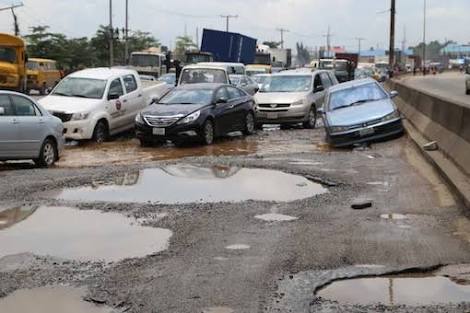
When it suspended rehabilitation works on the Lagos end of the Lagos-Ibadan Expressway last week, the appeal for patience by the Federal Ministry of Works and Housing was far from reassuring to commuters who had endured six years of anguish in the interminable reconstruction of the country’s premier highway. From Lagos to Ogun, Port Harcourt, Kaduna and all parts of the country, gridlock, robbery, kidnapping and health hazards have been the lot of drivers and passengers as construction teams work on major highways without adequate arrangements to reduce the impact on users, the economy and social activities.
A report in The PUNCH captured the hellish experience of many Nigerians on the 127-kilometre-long highway, Nigeria’s first expressway. Trapped in gridlock on both sides, commuters spend hours on the highway, rain or sunshine, frequently into the next day. Before the narrowed sections of the Expressway on the Kara Bridge were reopened, the gridlock had become permanent and drivers spending eight hours or more on the Ibadan-Lagos trip that previously took 90 minutes had become a common experience. Thus trapped, citizens were fair game for armed robbers prowling the Long Bridge-Warewa stretch.
Unchecked, armed robbers, rapists and muggers have also been having a field day on the Mile 2-Badagry Expressway, where failed portions of the road have, for years, combined with a decade-old ongoing expansion and rehabilitation programme, to create nightmarish gridlock. Lagosians have never had it so bad. Major expansion projects on the Lagos-Abule Egba-Ipaja-Toll Gate Highway, the Airport-Oshodi-Gbagada, Lekki-Epe, as well as the overhead bridge and ring road project at the Pen Cinema, Agege area, embarked upon by the immediate past governor, Akinwunmi Ambode, initially gladdened the hearts of residents, who welcomed the imminence of improved road infrastructure. But the expectations soon assumed nightmarish dimension for motorists and commuters due to lack of a detailed plan to manage the disruption and the failure of alternative roads. People regularly pass the night on highways with reports of frequent vehicle breakdowns, sudden health complications, women going into labour and ambulances trapped helplessly in the gridlock with their emergency patients.
The Lagos State Environmental and Special Offences (Enforcement) Unit and state Rapid Response Squad admit the menace of traffic robbers and rapists and stage regular raids, which have proved inadequate due to the laxity of the regular police.
The problem is two-fold: arrangements, where they exist at all, to manage the fallout of major rehabilitation works, have been miserably inadequate. Second, too many roads have gone horribly bad at the same time nationwide, the result of governance failure at federal, state and local government levels. Added to the prolonged rainy season, road users have endured untold hardship. But road reconstruction occurs everywhere and other more responsive governments manage this well and reduce the inevitable inconveniences to the public. Nigeria’s government should be more responsible and less contemptuous of the people.
They should also count the cost. The industrialist, Aliko Dangote, calculates that the economy loses up to N140 billion weekly from the horrific Apapa-Lagos gridlock alone; the Economic Intelligence Unit of the Lagos State Ministry of Economic Planning and Budget puts losses at $1 billion (N306 billion) monthly due to traffic congestion on the roads. Another World Bank study found traffic congestion in Cairo once cost Egypt four per cent of its GDP. It is a universal problem that compels governments to increasingly deploy resources, expertise and technology to solve.
Transport economists identify road traffic control as a special skill in highway management, involving vehicular and pedestrian traffic around a construction zone, accident or other disruption. The overall aim is to protect both commuters and construction workers and make commuting as painless as possible while the work lasts.
Rather than talk down at Nigerians, officials should log on to global best practices where full or partial road closures, lane closures, when strategically applied, effectively reduce hardship on road users. The United States Federal Highway Administration recommends massive public sensitisation, preparation of alternative routes prior to any closure and weekend closure to expedite project delivery. As in Germany, there is a traffic management plan ahead of road works in the USA, rigorously implemented; alternate or temporary roads are prepared, diversions with proper road signage and traffic managers and police on 24 hours duty, working in shifts to direct traffic and provide security, are deployed. Australia’s code requires traffic controllers to wear high visibility clothing, while in the United Kingdom, a traffic management plan is mandatory before any disruption due to road construction is approved by the Department of Transportation.
Technology is central in all this. Apart from signage, technology tools are also being applied: China, that has been adding 10,000 kilometres to its network annually since 2011, uses electronic signs to guide drivers and pedestrians, while specialised training is now offered in Australian and Canadian states and provinces respectively.
Today’s misery derives from poor service delivery by the public service and disregard for citizens. In the past, road reconstruction was better managed; as governor, Babatunde Fashola, who superintends the ineffective Federal Ministry of Works and Housing, managed traffic commendably during construction.
Going forward, well-structured plans should be mapped out ahead of major rehabilitation projects: palliative work on alternative routes and feeder roads needs to be done before hand, traffic personnel and police working in shifts should be available 24 hours and for major highways, the nights and weekends should be fully utilised to achieve speedy completion and less disruption to economic activities.
Governments should be more responsible by undertaking regular maintenance of highways to avoid the collapse of most roads at the same time as is being witnessed today. Traffic managers need to be more professional and firm. There should be zero tolerance for traffic offences and punishment should be particularly hard on those who drive against the traffic, an impunity indulged in by law enforcers, political office holders, and commercial vehicle operators that has assumed a monstrous level and often accounts for the complete lockdown of highways.
END

Be the first to comment